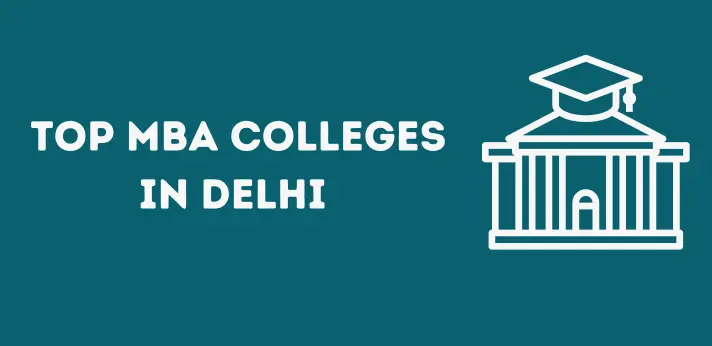Top MBA Colleges in Delhi: The MBA is a postgraduate degree that enhances business and management skills, covering four semesters. Students from any background can pursue it, with a minimum graduation score of 50% and passing the CAT entrance exam. An MBA degree is a popular postgraduate management course in Finance, Marketing, HR Management, and Supply Chain Management. It gives students a comprehensive understanding of business management and administration, developing analytical, decision-making, and leadership skills.
Experienced faculty members teach the program and is highly valued by employers. Graduates are sought after in various industries, ensuring they have the necessary skills to succeed in the competitive business world. This article will answer all your questions and inform you about the Top MBA Colleges in Delhi.
[Index]
Top MBA Colleges in Delhi
Many MBA colleges in Delhi admit students based on academic and management exam scores. Explore comprehensive details, including fees, overview, eligibility criteria, and average salary, to learn more about each college.
| S.No. | College Name | Establishment Year | College Fees |
| 1. | FMS New Delhi Faculty of Management Studies | 1954 | 1,92000 |
| 2. | MDI Gurgaon: Management Development Institute | 1974 | 20,86,670 |
| 3. | IIT Delhi: Department of Management Studies New Delhi | 1993 | 8,80,000 |
| 4. | IIFT New Delhi: Indian Institute of Foreign Trade | 1963 | 18,25,000 |
| 5. | IMI Delhi: International Management Institute | 1981 | 20,95,230 |
| 6. | Lal Bahadur Shastri Institute of Management – LBSIM New Delhi | 1995 | 15,50,000 |
| 7. | FORE School of Management, New Delhi | 1981 | 14,50,000 |
| 8. | SOIL Institute of Management | 2008 | 11,50,000 |
| 9. | DSE: Faculty of Commerce and Business, Delhi School of Economics | 1949 | 30,392 |
| 10. | JIMS Rohini: Jagan Institute of Management Studies | 1993 | 9,25,000 |
MBA Course Overview
The Master of Business Administration (MBA) is a two-year postgraduate program designed to equip students with a comprehensive understanding of business dynamics and unlock expansive career pathways across diverse industries. It covers finance, marketing, operations, human resources, strategy, and entrepreneurship, preparing graduates for leadership roles and a strategic gateway into the professional world.
| Particulars | MBA Course Details |
|---|---|
| MBA Full Form | Master of Business Administration |
| Types of MBA | Full-Time MBA, Part-Time MBA, Executive MBA (EMBA), Online MBA, Global MBA, Specialized MBA, Dual MBA Programs, Mini-MBA, Joint MBA Programs, Modular MBA, Accelerated MBA, Dual Specialization MBA |
| Course Level | Post Graduation |
| MBA Course Fee | INR 2 Lakh – INR 25 Lakh |
| Eligibility Criteria | Bachelor’s degree |
| Top MBA Entrance Exams | CAT, GMAT, GRE, MAT, XAT, CMAT, IIFT etc. |
| MBA Admission Process | Entrance Exam + Group Discussion + Personal Interview |
| Exam Type | Semester |
| Average Salary | 5 Lpa to 25 Lpa |
Why Choose an MBA?
An MBA degree is crucial for upward career progression, allowing individuals to reach high management positions. It’s an ideal switch of careers, offering numerous learning opportunities and a chance to start late. Here are some common reasons why individuals opt for an MBA:
Career Advancement: An MBA can open doors to leadership and managerial positions, providing a pathway for career progression.
Skill Development: MBA programs offer a well-rounded education, developing skills in leadership, strategic thinking, decision-making, and communication.
Networking Opportunities: Business schools provide a platform for building a strong professional network. Interactions with classmates, alumni, and industry professionals can lead to valuable connections.
Versatility and Specialization Options: MBA programs offer flexibility, allowing students to tailor their education to their specific career goals, making graduates more attractive to employers across various industries.
MBA Courses Eligibility Criteria
The eligibility criteria for MBA (Master of Business Administration) programs can vary depending on the institution and country. However, here are some common eligibility criteria that are often considered:
| Particulars | MBA Course Details |
|---|---|
| Educational Qualifications | A bachelor’s degree or equivalent from a recognized university is typically required, with some programs having specific requirements for the undergraduate major or field of study. |
| Minimum Percentage/Grade | MBA programs typically require a minimum undergraduate degree grade of 50% or its equivalent. |
| Work Experience (if applicable) | Some MBA programs, particularly executive MBA programs, may necessitate a certain amount of work experience, typically a few years, in a managerial or professional role. |
| Entrance Exams | MBA programs often require applicants to take standardized entrance exams like GMAT or GRE, and may also consider other entrance exams like the CAT in India. |
| English Language Proficiency | International applicants or English-medium instruction programs may require proof of English language proficiency through tests like TOEFL or IELTS. |
| Letters of Recommendation | Some MBA programs may require letters of recommendation from professors, employers, or other professionals to assess the applicant’s abilities and potential for success. |
| Statement of Purpose (SOP) or Essays | Applicants may be required to submit a statement of purpose or essays detailing their career goals, reasons for pursuing an MBA, and other relevant information. |
| Interviews | Institutions often conduct interviews as part of the admission process to evaluate an applicant’s communication skills, motivation, and program fit. |
